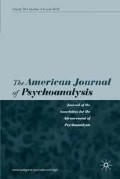Abstract
The patient lives in Berlin, the therapist in Lisbon and the supervisor in Budapest. Not long ago, continuous psychotherapy and supervision would have been impossible in such a setting. Nowadays, modern communication technologies via the Internet create new possibilities for patients, therapists, and supervisors. However, when we engage in psychoanalytic practice via modern means of telecommunication, we need to examine if the fundamental tenets of the psychoanalytic process are preserved. We need to think about initial assessment, about how we arrange the setting, how we work with transference and countertransference, what kinds of new forms of resistance we are facing and, indeed, how we can recognize new phenomena and handle inevitable problems. In this clinical paper, we tackle these questions in the context of three-times-a-week psychoanalytic psychotherapy.
Similar content being viewed by others
References
Carlino, R. (2011). Distance psychoanalysis: The theory and practice of using communication technology in the clinic. London: Karnac Books (Originally published in Spanish, in 2010).
Capparotta, L., & Lemma, A. (Eds.). (2014). Psychoanalysis in the technoculture era. Routledge: London.
Gallagher, S. (2005). How the body shapes the mind. New York: Oxford University Press.
Ferenczi, S. (1932). The clinical diary of Sándor Ferenczi. In J. Dupont (Ed.), In Hungarian: Klinikai napló (M. Balint & N.Z. Jackson (Trans.). Cambridge, MA & London: Harvard University Press, 1988 (Budapest: Akadémiai Kiadó, 1996).
Gurevich, H. (2016). Orpha, Orphic functions, and the Orphic analyst: Winnicott’s “regression to dependence” in the language of Ferenczi. American Journal of Psychoanalysis,76, 322–340.
Gallese, V. (2003). The roots of empathy: The shared manifold hypothesis and the neural basis of intersubjectivity. Psychopathology,36(4), 171–180.
Internet Live Stats. (2018). Internet live stats. Retrieved August 28, 2018, from http://www.internetlivestats.com/.
International Psychoanalytical Association. (2015). In IPA 49th congress, Boston, MA, United States, July 22–25, 2015.
International Psychoanalytical Association. (2017). In IPA 50th congress, Buenos Aires, Argentina, July 25-29, 2017.
International Psychoanalytical Association. (2018a). IPA policy on remote analysis in training and shuttle analysis in training. Retrieved August 29, 2018, from http://www.ipa.world/en/en/IPA1/Procedural_Code/IPA_Policy_on_Remote_Analysis_in_Training.aspx (Reference not cited in text? Or 2018a on p 26?).
International Psychoanalytical Association. (2018b). IPA practice note: On the use of telephone and/or VoIP technologies in analysis. Retrieved August 29, 2018, from https://www.ipa.world/IPA/en/IPA1/Procedural_Code/Practice_Notes/ON_THE_USE_OF_SKYPE__TELEPHONE__OR_OTHER_VoIP_TECHNOLOGIES_IN_ANALYSIS_.aspx.
Kohler, E., Keysers, C., Umiltà, M. A., Fogassi, L., Gallese, V., & Rizzolatti, G. (2002). Hearing sounds, understanding actions: Action representation in mirror neurons. Science,297, 846–848.
Marzi, A. (Ed.). (2016). Psychoanalysis, identity, and the Internet: Explorations into cyberspace. London: Karnac Books.
Merchant, J. (2016). The use of Skype in analysis and training: A research and literature review. Journal of Analytical Psychology,61(3), 309–328.
Microsoft Corp. (2018). Does Skype use encryption? FAQ. Retrieved September 20, 2018 from https://support.skype.com/en/faq/FA31/does-skype-use-encryption.
Psychoanalytic Electronic Publishing. (2018). Keyword search “Skype”. Retrieved April 9, 2018, from http://www.pep-web.org.
Prensky, M. (2001). Digital natives and digital immigrants. Part I. On the Horizon,9(5), 1–6.
Russell, G. I. (2015). Screen relations: The limits of computer-mediated psychoanalysis and psychotherapy. London: Karnac Books.
Scharff, J. S. (Ed.). (2013). Psychoanalysis online: Mental health, teletherapy, and training. London: Karnac Books.
Scharff, J. S. (Ed.). (2015). Psychoanalysis online 2: Impact of technology on development, training and therapy. London: Karnac Books.
Scharff, J. S. (Ed.). (2017). Psychoanalysis online 3: The teleanalytic setting. London: Karnac Books.
Tuckett, D. (2005). Does anything go?: Towards a framework for the more transparent assessment of psychoanalytic competence. International Journal of Psychoanalysis,86, 31–49.
Watkins, C. E., Jr. (2014). The competent psychoanalytic supervisor: Some thoughts about supervision competences for accountable practice and training. International Forum of Psychoanalysis,23, 220–228.
Watkins, C. E., Jr. (2016). Psychoanalytic supervision in the new millennium: On pressing needs and impressing possibilities. International Forum of Psychoanalysis,25(1), 50–67.
Yerushalmi, H. (Issue Editor) (2019). Introduction to special issue on supervision. Supervisory experiences and their context. American Journal of Psychoanalysis, 79(3), 253–264.
Zoom Video Communications, Inc. (2018). Video conferencing application. Retrieved September 20, 2018 from https://zoom.us.
Author information
Authors and Affiliations
Corresponding author
Additional information
Publisher's Note
Springer Nature remains neutral with regard to jurisdictional claims in published maps and institutional affiliations.
Csongor Juhos, Ph.D. is affiliated with the ISPA-Instituto Universitário, Lisbon, and a candidate at the Portuguese Psychoanalytical Society; as well as President of the Free Association.
Judit Mészáros, Ph.D. is affiliated with the Eötvös Lóránd University, Budapest; and a Training and Supervising Psychoanalyst at the Hungarian Psychoanalytical Society; as well as President of the Sándor Ferenczi Society.
Address correspondence to: Csongor Juhos, Ph.D., ISPA, Rua Jardim do Tabaco 34, 1149-041, Lisbon, Portugal.
Rights and permissions
About this article
Cite this article
Juhos, C., Mészáros, J. Psychoanalytic psychotherapy and its supervision via videoconference: experience, questions and dilemmas*. Am J Psychoanal 79, 555–576 (2019). https://doi.org/10.1057/s11231-019-09220-3
Published:
Issue Date:
DOI: https://doi.org/10.1057/s11231-019-09220-3




